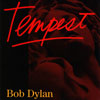BOB DYLAN : TEMPEST
- Duquesne Whistle
- soon after midnight
- narrow way
- long and wasted years
- pay in blood
- scarlet town
- early roman kings
- tin angel
- tempest
- roll on john
Label : Columbia
Release Year : 2012
Length : 68:32
Review (AllMusic) : Fifty years after Bob Dylan's debut album appeared, we get Tempest. Since he returned to recording original material on 1997's Time Out of Mind, he's been rambling through American musical styles - blues, country, folk, rockabilly, swing - that were popular before he was even on the scene. Tempest continues the exploration, but more urgently than on Modern Times and Together Through Life. It's a gritty, cantankerous record with abundant images of violence, lust, and humor, though the latter is often black. His protagonists settle scores with lovers, enemies, and power brokers; they're often self-aggrandizing and self-deprecating simultaneously. Most of these are story-songs, though none but "Tempest" tracks in a linear fashion. "Duquesne Whistle" opens nostalgically with steel and acoustic guitars playing a swing melody reminiscent of Bob Wills. When the band enters, it becomes a rockabilly shuffle with teeth. "Soon After Midnight" is a ballad with hazardous warnings ("...Two-Timing Slim/Who's every heard of him?/I'll drag his corpse through the mud"). "Narrow Way" is a blues wailer that faintly looks back at "Maggie's Farm." Dylan's lyric contradictions are in full force; the song asks unanswerable questions while expressing rage and vulnerability ("...Even death has washed its hands of you" and "Put your arms around me, where they belong"). "Pay in Blood" is a rocking venomous boast with one of his more memorable refrains: "I pay in blood, but not my own." "Early Roman Kings" is a basic rewrite of Muddy Waters' "Mannish Boy." David Hidalgo's old-world accordion plays the signature swaggering, razor-sharp guitar riff underscoring the notion that the blues are universal, timeless. Dylan's nasty rasp fueled by lust, vengeance, and power is balanced by his wicked humor: "I can strip you of life, strip you of breath/I can ship you down, to the house of death...I ain't dead yet, my bell still rings/I keep my fingers crossed like the early Roman kings." Musically, "Tin Angel" looks back to "Man in the Long Black Coat" for a frame. Lyrically, this is Dylan at his storytelling best; its twists and turns would be right at home on Blood on the Tracks and Desire - and it would have made a great closer. Sadly, that's not the case. The nearly 14-minute, 45-verse title cut retells the story of the Titanic with references to history - and the James Cameron film. Hearing it once is enough. "Roll on John," Dylan's elegy for friend John Lennon, closes the set. He uses a slew of Lennon's own lyrics as a tribute. The end result is moving but clumsy. These last two cuts aside, Tempest is still a damn fine album. Dylan is in mostly excellent form - even when sloppy; it sounds like he's having the time of his life.
Review (Humo) : Het is 2012 en eigenlijk kan ik al ruim tien jaar geen kwaad woord meer zeggen over Bob Dylan. In het slechtste geval, als hij muzikaal echt stinkt, een kerstplaat maakt of zichzelf als een schim herhaalt, kan ik nog altijd hartelijk om 'm lachen. Dat is wat Dylan voor heeft op de meeste anderen: he gets away with shit. En voor je het weet, gooit hij je weer een meesterwerk in het gezicht. 'Tempest' is misschien geen meesterwerk, maar veel scheelt het niet. Dat iemand níét vrolijk wordt van de opener en single 'Duquesne Whistle', met zijn ouwerwetse jarentwintigintro en vingerknippend vervolg, kan ik me eenvoudigweg niet voorstellen. Of als Dylan in de clip een eerste keer om de hoek komt gewandeld met zijn onbestemd gezelschap: grijnzen van plezier. 'Tempest' is een plaat waarop Dylan en zijn begeleidingsgroep (de touringgroep aangevuld met een stilletjes aanwezige en hier en daar gaatjes vullende David Hidalgo van Los Lobos) hun tijd nemen om de songs hun werk te laten doen. Dat betekent: lange songs. Drie van meer dan vijf minuten, drie van meer dan zeven, eentje van negen en een titeltrack van net geen véértien minuten. Geen probleem, want net tijdens die lange tochten wordt duidelijk hoe goed de groep wel is. Met de alsmaar beter wordende en steeds meer als Dylans schaduw opererende gitaar van Charlie Sexton in een glansrol. In het refrein van 'Duquesne Whistle' trekt ze met subtiele streken de vocalen een andere dimensie in, in 'Pay in Blood' (met Dylans meest bijtende oneliner: 'I pay in blood, but not my own') mag ze, allicht op zacht verzoek van de meester, een klein Keith Richards-dansje doen. Bob heeft zijn liefde voor The Rolling Stones nooit weggestoken, en dat hij met John Lennon en The Beatles op weliswaar competitieve maar ook vriendschappelijke voet leefde, was ook bekend. Pas nu echter, meer dan dertig jaar na Lennons dood, heeft Dylan een afscheidslied geschreven voor zijn vroegere vriend. 'Roll on John' zit helemaal op het einde van 'Tempest', en bevat naast een paar clevere tekstuele referenties de juiste dosis sentiment om net geen plakkerige tearjerker te worden. Soms is het blijkbaar beter het ijzer gevoelig te laten afkoelen vooraleer het te smeden. Op het internet doen theorieën de ronde dat 'Tempest' Dylans laatste plaat zou zijn. Het laatste toneelstuk dat Shakespeare schreef, heette 'The Tempest', vandaar. Dylan is eenenzeventig en puur mathematisch gezien wordt de kans dat het zijn laatste is inderdaad steeds groter, maar geconfronteerd met zijn potentieel profetische titel, reageerde Dylan: 'Dat stuk van Shakespeare heet 'The Tempest', mijn plaat heet 'Tempest'.' Roll on, Bob.
